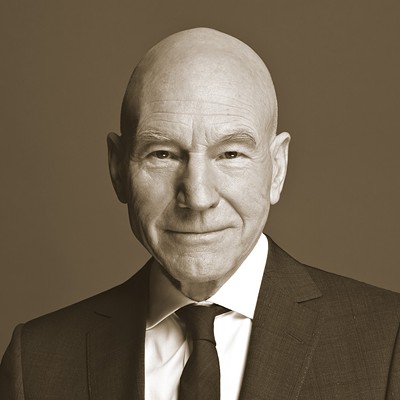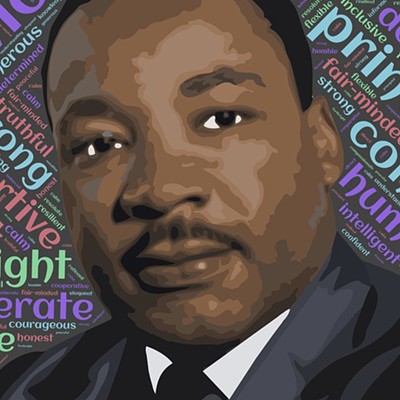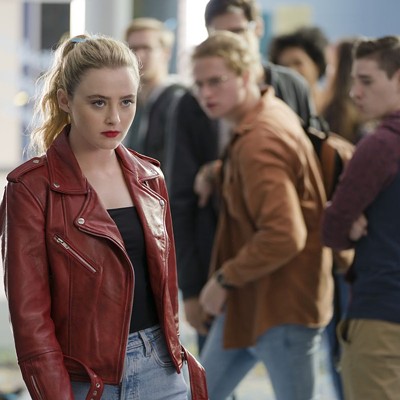Today’s movies are full of big–name actors whose faces — and box–office draw — are certified commodities. Then there are the journeyman thespians, whose presence and skill often turn good films into great ones. They don’t appear on a lot of magazine covers, but Hollywood would be bereft without their considerable contributions.
Such an actor is Patricia Clarkson, who’ll be honored Nov. 4 at the Savannah Film Festival. The New Orleans native has appeared in nearly 50 films, some of them high–profile (The Green Mile, Good Night and Good Luck, All the King’s Men, Miracle) and some of them smaller films that critics — and ultimately, audiences — adored.
(That’s a big list, and it includes Pieces of April, Far From Heaven, High Art, The Station Agent, Dogville, Elegy, The Woods, Lars and the Real Girl and Woody Allen’s Vicky Christina Barcelona).
Clarkson, in fact, has become part of Allen’s stable of repeat performers; she co–starred in this year’s Whatever Works for the director, and her Savannah appearance follows a screening, earlier in the day, of that Larry David–starring comedy.
Clarkson’s no stranger to TV, either: She won two Emmys for her portrayal of Sarah O’Connor on Six Feet Under, appeared in five episodes of Frasier and two full seasons of Murder One, and just this year played Justin Timberlake’s mother in a wacky Saturday Night Live short.
The movies love her best, though, and she was Academy Award and Golden Globe–nominated for her work in Pieces of April, as the dying matriarch of a dysfunctional family.
Recently wrapped for the actress is Cairo Time, in which she plays a woman who moves to Egypt with her diplomat husband, and begins an affair with a local man.
In February, she’ll be in theaters in Shutter Island, based on a Dennis Lehane novel and directed by Martin Scorsese.
People know you immediately when they see you on the screen, but perhaps they don’t know your name. Are you comfortable with your level of recognition?
Patricia Clarkson: I think it depends on the city. In New York, or New Orleans or Los Angeles, people know who I am. I’m an art film actress. I’m a character actress, although I do leading ladies I do tend to be a chameleon. I do change and shift. And I think I look different in person than I do on film.
I am in this for the work, obviously. I’ve walked away from a lot of money, in television and even in film, to pursue things that I love. It doesn’t mean that I don’t love making money and doing studio films — which I’ve done a few — but when I was at Yale School of Drama, I was working in a certain way and I said “This is what I want. I hope my whole life is this. I hope my career becomes this.” And it sort of did.
I loved doing everything. At Yale, I was the young leading lady, the ingenue, but I also got to do really crazy things, and things that were very different for me. Things that required a shift and a change in your DNA.
Delete - MergeI’m just an actor who happens to be lucky enough, at 49, to still be working. Having a lot of work — usually more than I know what to do with. Which is an embarrassment of riches that I do not take lightly. It’s an ageist business — it’s a little easier for men, but it’s still difficult.
Could you make a living – and would you be happy – just doing independents?
Patricia Clarkson: The parts are far fewer in studio films for women of a certain age. Independent film can still celebrate women past 40, and really put them front and center. And someone like Woody Allen, even though it’s an independent film it’s still Woody Allen, so it’s such a big deal. I love doing these small films, but I’m really open to anything where I love the script, I love the part, I love the people involved.
What would you say was your breakout role?
Patricia Clarkson: Hands down, High Art. It changed my life completely. Which I never expected in a million years. It was an independent film that was shot for $500,000. Maybe I’m not recognized on every street, but there’s not a single person in this business who doesn’t... I haven’t been on an audition in eight years. High Art changed my status in the business utterly, completely.
We first saw you in Brian DePalma’s The Untouchables.
Patricia Clarkson: That was my very, very first movie, when I was 25. I had never done a movie, and Brian was fabulous to me, and we’re still friends to this day. I adore him. It was a beautiful moment to be cast in The Untouchables. I was clueless that I was in this enormous movie. I didn’t know enough to be overwhelmed. I was literally right out of Yale. I was on Broadway doing House of Blue Leaves.
And that was a big break — but it was almost nine years later when I got the break I really wanted. High Art propelled me to a place that I had really longed for, for a long time.
In February, you’re in Martin Scorsese’s Shutter Island. I’d like to ask about the film.
Patricia Clarkson: It’s a classic Dennis Lehane thriller. I don’t want to give too much away about my part, because if you’ve read the book you know it’s kind of a surprise. It’s a stunning thriller set in a mental institution on an island in the 1950s. It’s quite breathtaking in its scope and its intensity. It’s one of the great scripts, truly, and it will shock you to the very end.
Tell me what the Martin Scorsese experience is like.
Patricia Clarkson: It’s the best of the best. I mean, I worked with Woody Allen and Scorsese back to back when I shot these films. I left Whatever Works for a week to work with Scorsese, then went back to Woody. So it was Woody, Marty, Woody. It was a truly great career high. It really doesn’t get any better. And they’re very different directors, but very similar in that greatness is a common denominator.
Are they very similar in that they must get what they want, but trust the actor to bring in their part of the equation?
Patricia Clarkson: That’s what great directors do. They trust you. They have incredible confidence in you, and in themselves, and they have the vision. They are so assured in their power, and not in a manipulative way by any means. They’re antithetical to that. There is an ease and a grace that exists in these two of the greatest directors ever.
They are, obviously, formidable, but incredibly personable at the same time.
What’s Todd Haynes (Far From Heaven) like to work with as a director?
Patricia Clarkson: Fabulous. Just a visionary, a powerful man in his own kind of quirky, quiet way. Just a love. Again, he gives you great confidence and has great confidence in you. He’s a dreamy man. He’s really dreamy.
How about George Clooney (Good Night and Good Luck)?
Patricia Clarkson: Oh, George, well as we’re talking about dreamy men... George is so stunning. I believe that what exists on camera is what exists off. He just creates this beautiful environment for an actor to work. This set is everywhere — it encompasses all people, cast and crew. It was very difficult when the movie was ending and we all had to go home. We really didn’t want to.
A thespian question: How do you approach a new character? Do you create her back story for yourself, or does it come in the moment?
Patricia Clarkson: There is something that is beyond worth that happens when you read a script and you read the character. Often, things that happen to me when I approach a character are things that come to me from the second I read the character.
That’s why I take a character, because something happens to me when I read it. Yes, it does require work — it requires thought and emotional connection and input, and commitment to it.
Is it all there in the script?
Patricia Clarkson: No. I mean yes, to some extent of course, absolutely. My part in Whatever Works was a divine part, and so much of it was one the page. But sometimes a part is very spare, so you really have to fill in the blanks. But with Woody Allen, it’s all there. You have to really just rise to the occasion.
So it just depends. I think an actor has to know emotionally, psychologically, physiologically where you have to go. And you have to hone your instincts — that’s why, hopefully, you get better the more you do it. Because it is a craft, and hopefully at some point you lift it to art. But that’s hard to do. cs
Savannah Film Festival: Patricia Clarkson Tribute
Where: Trustees Theater, 216 E. Broughton St.
When: At 7 p.m. Wednesday, Nov. 4
Tickets: $5–$10, at (912) 525–5050, includes screening of Broken Embraces
Screening: Whatever Works at 2:30 p.m.































